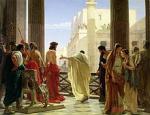Disable ads!
Pontius Pilate
Pontius Pilate (/ˌpɒn(t)ʃəs ˈpaɪlət/ or /ˌpɒnti.əs ˈpaɪlət/; Latin Pontius Pilatus, Greek: Πόντιος Πιλᾶτος, Pontios Pīlātos) was the fifth prefect of the Roman province of Judaea from AD 26–36. He served under Emperor Tiberius, and is best known from the biblical account of the trial and crucifixion of Jesus. The sources for Pilate's life are an inscription known as the Pilate Stone, which confirms his historicity and establishes his title as prefect; a brief mention by Tacitus; Philo of Alexandria; Josephus; the four canonical gospels; the Gospel of Nicodemus; the Gospel of Marcion; and other apocryphal works. Based on these sources, it appears that Pilate was an equestrian of the Pontii family, and succeeded Valerius Gratus as prefect of Judaea in AD 26. Once in his post he offended the religious sensibilities of his subjects, leading to harsh criticism from Philo, and many decades later, Josephus. According to Josephus c. AD 93, Pilate was ordered back to Rome after harshly suppressing a Samaritan uprising, arriving just after the death of Tiberius which occurred on 16 March in AD 37. He was replaced by Marcellus. In all four gospel accounts Pilate lobbies for Jesus to be spared his eventual fate of execution, and acquiesces only when the crowd refused to relent. He thus seeks to avoid personal responsibility for the death of Jesus. In the Gospel of Matthew, Pilate washes his hands to show that he was not responsible for the execution of Jesus and reluctantly sends him to his death. The Gospel of Mark, depicting Jesus as innocent of plotting against the Roman Empire, portrays Pilate as reluctant to execute Jesus. In the Gospel of Luke, Pilate not only agrees that Jesus did not conspire against Rome, but Herod Antipas, the Tetrarch of Galilee, also finds nothing treasonable in Jesus' actions. In the Gospel of John, Pilate states "I find no guilt in him [Jesus]," and he asks the Jews if Jesus should be released from custody. Scholars have long debated how to interpret Pilate's portrayal in the sources. The significance of the Pilate Stone, an artifact discovered in 1961 that names Pontius Pilate, is similarly debated by scholars.
 Read more on wikipedia.org Read more on wikipedia.org
 All quotes by Pontius Pilate All quotes by Pontius Pilate
 Edit Edit
|

|
|
|
|
|
Background photo by Giuliana
|